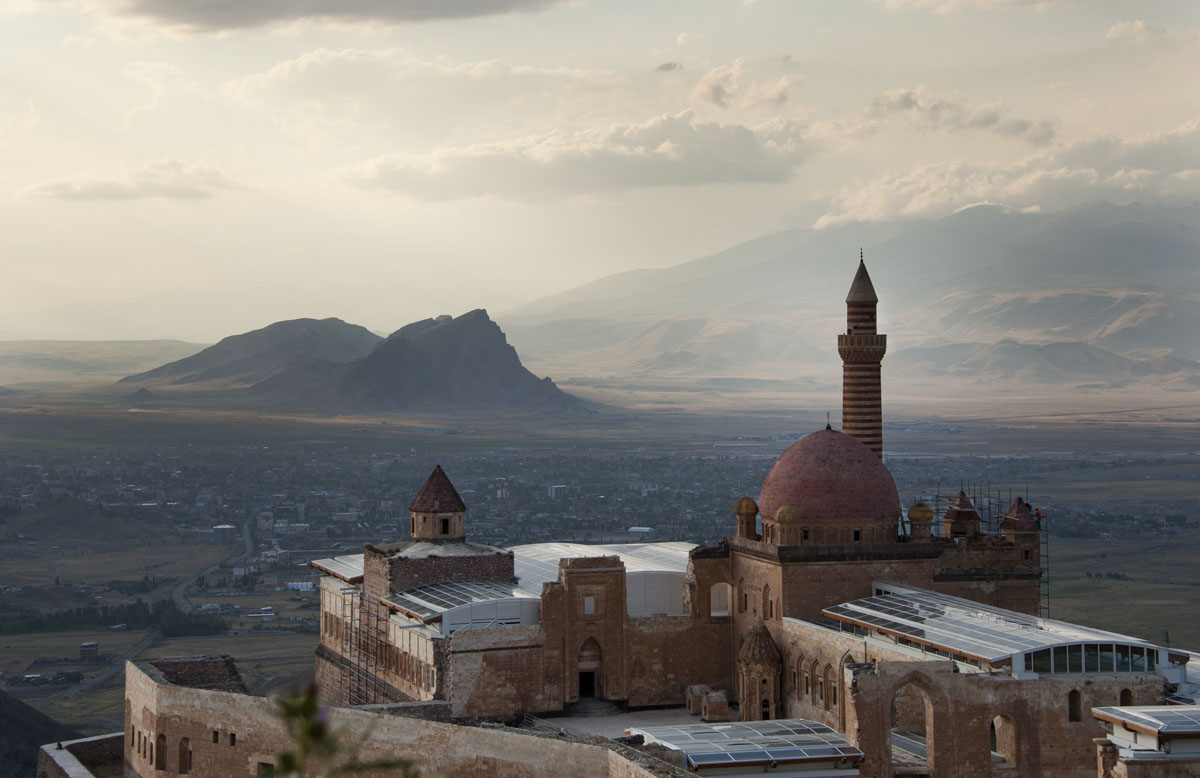
Come in, come in! A young lady called us from her doorstep. I didn’t understand her language, but I could see her hands, pointing towards the gate, furling and unfurling with the international gesture for ‘Come in, join us, you’re welcome here.’
We had been warned not to linger outdoors after dark in Diyarbakir. The unofficial capital of Turkish Kurdistan had a seedy reputation, and our Couchsurfing host had invited us to have dinner with his friends.
Yet, sunset had caught us unaware. The historic centre of Diyarbakir is a maze of backstreets, a medina where the sun barely shines and there’s something to see and do behind every corner: a Syriac Orthodox church with slate-grey walls and a bearded priest that spoke Aramaic, Jesus’s language; the Great Mosque, its interiors under renovation, with a dozen old men sitting outside on wicker chairs, rosary beads in-hand.
It was Ramadan. Sunset meant iftar, the breaking of the fast. Before getting to Turkey, I didn’t know that the month of Ramadan falls at different times each year — and that this year, it was approximately the whole of August. Muslims are to abstain from eating and drinking from sunrise to sunset for the whole of Ramadan — a feat when the sun rises at 4:00am and sets at 8:30pm, and the temperature outside touches 40° Celsius.

Photo by Nicholas Burns, thecrowdedplanet.com
We had entered Turkey at the exact moment Ramadan began. We were travelling by train from Sofia to Istanbul and our train stopped for border controls at sunrise of the first day of Ramadan. I turned in my bunk, comforted by the call to prayer floating through my window and the scent of thyme filling the dusty compartment.
In Istanbul and Cappadocia, you could barely tell it was Ramadan. The bars were full of locals and tourists, and food and drinks were served all day long. But once we got to Eastern Turkey, the atmosphere changed completely. In Urfa, a holy city for Christians, Jews, and Muslims and the legendary birthplace of Abraham, we met perhaps only a dozen tourists during the whole of our stay. The streets were deserted during the day, and the few shopkeepers who kept their stores open sat half asleep in the shade or under creaking ceiling fans. I couldn’t imagine what they were going through, and how the extent of their faith helped them withstand 14 boiling hours without food and water. We went through three two-litre bottles of water a day, making sure we ate and drank out of the sight of locals. The sun shone without respite, burning our skin and making any kind of physical activity impossible, especially in the early afternoon.
Just before sunset, locals left their homes and walked to the parks, baskets laden with all kinds of goodies. Everything was laid out carefully on picnic blankets and when the last rays of sun disappeared behind the mountains, and the call to prayer filled the street from the mosque loudspeaker, the feast began.
Hennaed fingers, thick callused hands, children’s hands of all shapes and sizes picked up dates, pieces of fruit, olives, morsels of bread. Then came manti, Turkish ravioli in garlicky sauce, dolmades still hot and steamy, vine leaf rolls with rice and big meaty chunks, çorba (soups) of all kinds, transported in stainless-steel thermoses.

Photo by Nicholas Burns, thecrowdedplanet.com
We spent three nights in Urfa and for every single iftar we were invited to join a family. We ate stuffed zucchini with refugees from nearby Syria, only a few kilometres away beyond the mountains, lucky enough to have escaped in the early days of the war. We shared freshly baked bread with a Kurdish family and salads with a Turkish one.
As we moved eastwards from Urfa, iftar became the highlight of our day. In Kars, our Couchsurfing host invited us to join him at his auntie’s home. She started laughing the moment I entered the room, and stopped when I left. ‘You are so skinny! How can you ever become a mother?’ She lifted her hefty frame from the divan to pick up yet another fried pastry.
In Trabzon, we ate through the night with a group of local students, first juicy kebabs with squeezed lemon juice, then salads with tangy pomegranate and assorted dips from an all-you-can-eat buffet — and I mustered my courage to try çig kofte, raw meatballs made with bulgur wheat, beef, and various spices. When we tried to pay, the cashier refused to take our cash. You are guests in our country, he said.
Yet, up until Diyarbakir, we had never been invited to enter a private home out of the blue. The young woman kept motioning towards the gate, inviting us in. We hesitated, biding time, pretending to take pictures.She wore a paisley shirt and a Kurdish headscarf, and had a string of pearls around her neck. I spied from the corner of my eye, saw a crib in a corner of her front garden and heard the coos of a baby. Let’s go in, I thought.

Photo by Nicholas Burns, thecrowdedplanet.com
It was one of those nights that I’ll keep in my heart forever. The family seemed genuinely happy to have us for dinner, and busied back and forth to make us comfortable. They pulled up two chairs and fed us until we burst: dates, lentil soup, lamb stew on rice, sticky, honeyed sweets, even pink ice cream.
Sadly, we couldn’t communicate. We had no language in common, and no Google Translate with us. It was an evening of shared glances, laughs, gestures of hospitality. An evening of gratitude — their gratitude towards us, for having accepted their gift, and our gratitude towards them, for having opened their house and hearts to us, two scruffy backpackers wandering the streets of Diyarbakir after sunset.
Read more stories of Ramadan in our special-edition digital magazine.